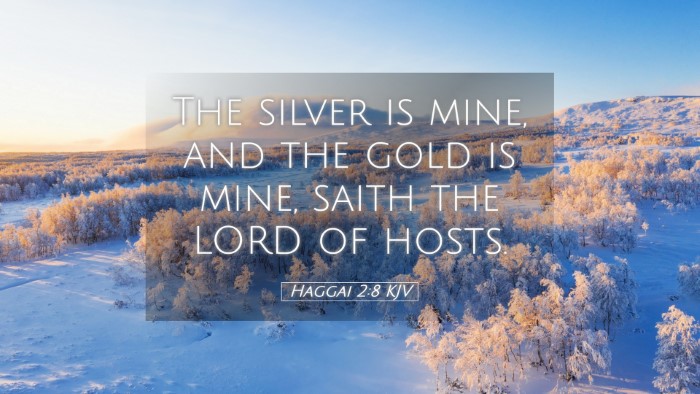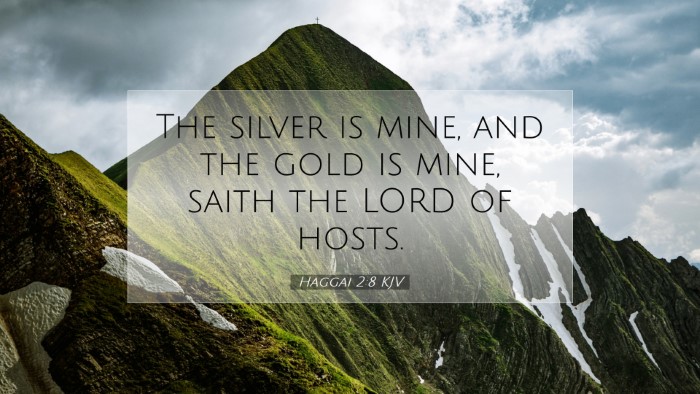Old Testament
Genesis Exodus Leviticus Numbers Deuteronomy Joshua Judges Ruth 1 Samuel 2 Samuel 1 Kings 2 Kings 1 Chronicles 2 Chronicles Ezra Nehemiah Esther Job Psalms Proverbs Ecclesiastes Song of Solomon Isaiah Jeremiah Lamentations Ezekiel Daniel Hosea Joel Amos Obadiah Jonah Micah Nahum Habakkuk Zephaniah Haggai Zechariah MalachiHaggai 2:8
Haggai 2:8 KJV
The silver is mine, and the gold is mine, saith the LORD of hosts.
Haggai 2:8 Bible Commentary
Bible Commentary on Haggai 2:8
Verse Text: "The silver is mine, and the gold is mine, saith the LORD of hosts." (Haggai 2:8, KJV)
Introduction
The book of Haggai presents a critical moment in Israel's history post-exile, where the focus is on the rebuilding of the temple. This particular verse, Haggai 2:8, serves not only as a proclamation of God's sovereignty but also as a reminder of His ultimate ownership of all material wealth.
Commentary Insights
Divine Sovereignty
Matthew Henry emphasizes the authority of God over all creation. The declaration that "the silver is mine, and the gold is mine" underscores the notion that tangible wealth does not belong to humanity but to the Creator. This assertion serves to align the people's priorities towards spiritual rather than material wealth.
The Nature of God's Provision
Albert Barnes interprets this verse as an assurance to the Israelites that God, as the owner of all wealth, is capable of providing for their needs. It reflects God's intention to bless those who diligently work for Him. Thus, they should not fear inadequacy in their resources when building His house.
God as the Source
According to Adam Clarke, this verse highlights the futility of trusting in worldly wealth. He suggests that while gold and silver may seem valuable to mankind, it is God who truly owns everything. This insight encourages the faithful to place their trust in God rather than in unpredictable riches.
Spiritual Implications
Scholars agree that this proclamation connects to the spiritual priorities of the people of God. God's declaration serves as a reminder that His blessings, symbolized by silver and gold, are contingent upon obedience and alignment with God's divine will.
The Rebuilding Context
Haggai's message came during a time of apathy and discouragement among the Jewish people regarding the reconstruction of the temple. As Matthew Henry observes, this verse is intended to motivate them, reminding them that their labor in rebuilding the temple is not in vain, as they are working with God's resources.
- God's Encouragement: The Israelites were encouraged that God would supply the means necessary for them to carry out their tasks.
- Human Response: The ownership of resources by God should elicit a response of faithfulness and dedication from His people.
Theological Reflections
This verse invites deeper reflection on the nature of wealth and divine ownership. It challenges the believers to view their possessions through the lens of stewardship rather than ownership. In light of God's sovereignty, the faithful are called to prioritize heavenly treasures over earthly ones.
Stewardship in Ministry
In pastoral ministry, acknowledging God's ownership of silver and gold leads to an understanding of stewardship. The church and its leaders are called to manage God's resources wisely for His glory. This foundational understanding shapes attitudes toward giving, missions, and community support.
Application to Modern Day
The principles derived from Haggai 2:8 transcend time. As theologians and scholars study this text today, they find relevance in issues of wealth distribution, economic justice, and the ethical use of resources. The verse challenges believers to seek first the kingdom of God, trusting that His provision will be evident in their lives.
Conclusion
Haggai 2:8 serves as a powerful reminder of God's sovereignty over all material wealth. For pastors, students, and scholars, this verse encourages a focus on God's mission and a reliance on His provisions, leading to faithful stewardship. As the church continues to fulfill its role in the community, the acknowledgment of God's ownership of resources should shape every decision and action taken in His name.


